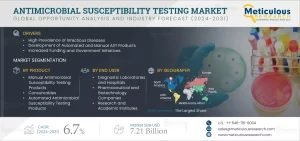The Dental 3D Printing Material Market was valued at $0.8 billion in 2023. This market is expected to reach $5.4 billion by 2031, from an estimated $1 billion in 2024, at a CAGR of 27.3% during the forecast period 2024-2031.
In the past decade, 3D printing technology has significantly transformed the field of dentistry. This innovation allows for the fully automated production of customized dental devices tailored to individual patient needs. The process involves using light or lasers to polymerize a liquid resin, achieving the precise detail required for small, intricate objects. Dental 3D printing materials are specifically formulated for creating final-placement dental models. The advent of this technology is reshaping the dental industry, propelled by advancements in computer-aided design (CAD) and enhanced imaging techniques such as cone beam computed tomography (CBCT) and magnetic resonance imaging (MRI).
Download Sample Report Here @ https://www.meticulousresearch.com/download-sample-report/cp_id=5204
One major driver of digital dentistry and 3D printing in dental applications is the high incidence of oral diseases. According to electronic health data, the digital transformation in dental medicine is recognized as one of the most significant changes of the 21st century, addressing both current and future challenges in dental healthcare. Oral diseases are a considerable public health issue, affecting nearly 3.5 billion people worldwide. The most prevalent dental condition is untreated dental caries in permanent teeth, impacting 60-90% of school-aged children and a majority of adults in industrialized countries. Furthermore, periodontal diseases affect approximately 20-50% of the global population, highlighting a pressing health concern. Older adults are particularly susceptible to root caries due to factors like increased gingival recession and the side effects of medications that cause dry mouth. Nearly 50% of individuals over the age of 75 have root caries affecting at least one tooth.
As the prevalence of oral diseases rises, there is an increasing awareness of oral health, coupled with rapid technological advancements, which are driving the expansion of cosmetic dental procedures. Demand for these services is particularly high among two age groups: 24-40 and 57-75. Individuals aged 24-40 often seek dental aesthetics, including implants and veneers, for a youthful look, while those aged 57-75 primarily require dentures. This shift in patient preferences is moving the industry from a focus on basic hygiene to a stronger emphasis on image enhancement. The emergence of two key concepts—biomimetics and biocompatibility—has paved the way for the future of cosmetic dentistry. Factors such as rising disposable incomes dedicated to personal appearance, the influence of social media and celebrities, and technological advancements in cosmetic dentistry, particularly through CAD/CAM systems (Computer-Aided Design and Computer-Aided Manufacturing), are driving the growth of this sector.
Browse in Depth: https://www.meticulousresearch.com/product/dental-3d-printing-material-market-5204
Historically, the dental field was shaped by subtractive manufacturing methods, commonly known as milling. However, these methods struggled to replicate complex models due to their inability to account for internal structures.
Modern CAD software now employs sophisticated algorithmic designs and artificial intelligence to model various objects and tissues precisely as needed. In addition, the introduction of new materials and improvements in manufacturing speed are crucial developments in 3D printing technology.
Innovative biocompatible materials closely mimic the aesthetic qualities of ceramics, while new transparent flexible resins are emerging for numerous dental applications. Design challenges previously hindered the widespread adoption of 3D printing; however, there are now many laboratories offering affordable design services that fully realize clinical outcomes. Advances in software are further propelling growth within the dental 3D printing sector. All these factors contribute to the expansion of the dental 3D printing materials market, which is projected to reach $5.4 billion by 2021, growing at a compound annual growth rate (CAGR) of 27.3%, according to Meticulous Research®.
Quick Buy: https://www.meticulousresearch.com/Checkout/73686619
Dental 3D Printing Material Market Research Summary
| Particulars | Details |
| Number of Pages | 190 |
| Format | |
| Forecast Period | 2024-2031 |
| Base Year | 2023 |
| CAGR | 27.3% |
| Estimated Market Size (Value) | $5.4 billion by 2031 |
| Segments Covered | By Type
By Application
|
| Countries Covered | North America (U.S. and Canada), Europe (Germany, France, U.K., Italy, Spain, Switzerland, Sweden, Poland, and Rest of Europe), Asia-Pacific (China, Japan, India, Australia, South Korea, and the Rest of Asia-Pacific), Latin America (Brazil, Mexico, Rest of Latin America) and the Middle East & Africa |
| Key Companies | The key players operating in the Dental 3D Printing Material market are 3D Systems Corporation (U.S.), EnvisionTEC (U.S.), DWS S.r.l. (Italy), Keystone Industries (U.S.), VOCO GmbH (U.S.), DMG Chemisch-Pharmazeutische Fabrik GmbH (Germany), Stratasys Ltd. (Israel), Prodoways Tech (France), Formlabs Inc. (U.S.), DENTSPLY SIRONA Inc. (U.S.), 3M Company (U.S.), Den-Mat Holdings, LLC (U.S.), Shandong Huge Dental Material Co., Ltd. (China), Ultradent Products, Inc. (U.S.), and Straumann Holding AG (Switzerland). |
Contact:
Meticulous Market Research Pvt. Ltd.
1267 Willis St, Ste 200 Redding,
California, 96001, U.S.
USA: +1-646-781-8004
Europe : +44-203-868-8738
APAC: +91 744-7780008
Email- sales@meticulousresearch.com
Visit Our Website: https://www.meticulousresearch.com/
Connect with us on LinkedIn- https://www.linkedin.com/company/meticulous-research






